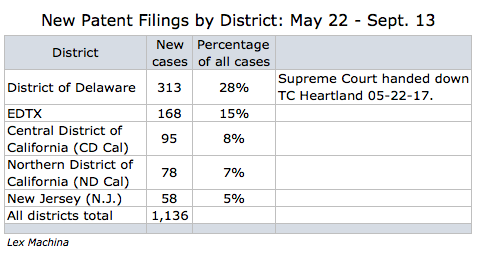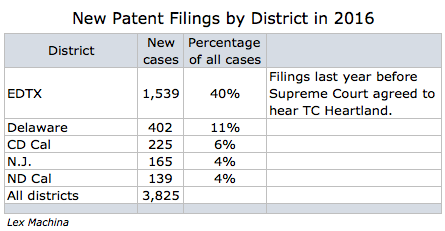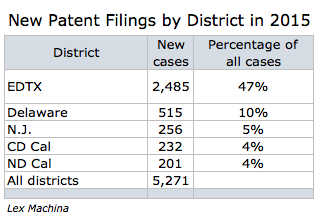The Eastern District of Texas has lost its status as America’s top place to sue businesses for patent infringement. Delaware is the new king of patent litigation.
New data provided exclusively to The Texas Lawbook shows that new patent lawsuits filed in the federal courts of East Texas declined significantly during the past four months.
At the same time, federal judges in the Eastern District have dramatically increased the rate at which they transfer infringement cases to other districts.

Just one year ago, patent holders filed three times more infringement lawsuits in East Texas than they did in the Delaware federal courts. But new statistics from Lex Machina shows that the two jurisdictions have completely flipped in popularity this summer.
During the past four months, plaintiffs filed nearly twice as many patent cases in Delaware than they did in the Tyler-based Eastern District of Texas, according to Lex Machina, a unit of Lexis-Nexis.
Legal experts say the primary reason is the U.S. Supreme Court’s decision on May 22 in a case called TC Heartland vs. Kraft – a ruling that severely limited the ability of patent holders to sue those who violate their patents nearly anywhere in the U.S. At the same time, East Texas federal judges followed the national trend by implementing new rules placing higher standards on those plaintiffs who do file new patent infringement lawsuits in their courts.
“The Supreme Court took the title of ‘Patent Litigation Hotbed’ away from the Eastern District of Texas and awarded it to the District of Delaware,” says William Munck, managing partner at Dallas-based Munck Wilson Mandala. “Patent litigation became a lot cheaper for the defendant because of this decision.”
Lex Machina reports that businesses and individuals filed 169 new infringement lawsuits in the Eastern District of Texas since the Supreme Court’s decision in May – a 68 percent decline from the same period in 2016.
At the same time, the number of new patent cases in the Delaware federal courts skyrocketed to 313, which was nearly double from the year before.
“Before TC Heartland, plaintiffs filed three patent cases in the Eastern District for every one in Delaware,” says Charles Walker, the Houston-based U.S. head of intellectual property disputes at Norton Rose Fulbright.
“Since TC Heartland, plaintiffs have filed roughly two new patent cases in Delaware for every one in East Texas,” he adds. “But those two districts still account for 40-plus percent of new patent cases.”
So far this year, 706 new patent suits have been filed in East Texas – down 35.2 percent from the same point last year, according to Lex Machina.
The California-based data and research firm predicts that the decline in new patent infringement complaints will continue through the rest of 2017 and will be the lowest number of new filings in the Eastern District since 2012.
Legal experts say that the TC Heartland decision has proven especially difficult for “non-practicing entities,” which purchase or develop patents but do not use them to manufacture products or provide services. Instead, they use the patents to generate revenue by targeting companies that used the patented-technology without a licensing agreement.
NPEs have been pejoratively labeled as “trolls” because they make no products and because some NPEs use low quality patents to force companies to settle lawsuits for less than the cost of fighting the dispute in court.
East Texas has been the go-to spot for NPEs and trolls for several years because of its efficient judges and local rules that require defendants to put a significant amount of costly legal work into a case before the judges even schedule a case management conference, Munck says.
“The district’s local rules are as rigid as they are quick,” Munck says. “Delaware, while known for being patent-savvy, does not require this up-front investment. It is certainly not considered pro-plaintiff, as many think of the Eastern District to be.”
But NPE cases have declined in all districts in recent years, including in East Texas.


Judges nationally, including U.S. District Judge Rodney Gilstrap of Marshall, have thrown out trolls’ lawsuits and ordered them to pay defendants’ attorney fees for seeking nuisance settlements for baseless claims.
“I expect we will have the second-largest patent docket in the nation in two years,” says Michael Smith, a Marshall-based blogger and partner at Siebman Burg Phillips & Smith. “We will have significantly fewer cases, including a sharp drop in small suits from NPEs.
“In the next few years, our caseload will probably be similar to what it is now,” Smith says. “We are roughly at the same level we were between 2007 and 2012.”
For now, TC Heartland is allowing defendants to move cases out of East Texas at a clip unmatched in the district’s recent history.
Lex Machina data shows that defendants in patent disputes had a coin flip’s chance of success of getting East Texas judges to grant their motions to transfer cases to other jurisdictions before the TC Heartland went to the Supreme Court.
But those odds improved nearly 50 percent since the decision.
Eastern District judges granted 322 motions and denied 316 requests to transfer jurisdiction between January 2009 and May 22, 2017.
Since the Supreme Court’s decision, East Texas judges have granted defendants’ requests to move their cases to other courts 31 times and denied only 10 such motions, according to Lex Machina data
“This is a real sea change, both in grant rates on transfer motions and in where new cases are being filed,” says Brian Howard, Lex Machina’s associate general counsel and data scientist.
Lawyers who specialize in patent law say they expect it will be a year or more before the U.S. Court of Appeals for the Federal Circuit provides additional guidance on significant venue-related questions, which could impact the Eastern District of Texas even further.
For example, the appeals court’s docket will include Cray Inc.’s appeal of a June 29 order by Eastern District Judge Rodney Gilstrap that laid out a four-prong test for determining whether a defendant had a “regular and established place of business” there.
For domestic corporate defendants, TC Heartland says venue is determined by the general patent statute of 28 USC 1400(b).
That statute limits venue to the state where the defendant is incorporated or “where the defendant has committed acts of infringement and has a regular and established place of business.”
“This will raise a number of as-yet unsettled issues regarding the boundaries of what constitutes a ‘regular and established place of business,’ such as whether physical structures, full-time employees or corporate control will be required,” according to a briefing by Gray Reed attorneys.
TC Heartland did not change the Supreme Court’s 1972 ruling in Brunette Machine Works vs. Kockum Industries that held foreign defendants can be sued most anywhere, according to the briefing by Dallas partners Eric Tautfest and Jarred Hoggan.
“However, the Court left open the possibility for later review of Brunette,” the pair wrote.
Though East Texas may no longer be tops on America’s infringement docket, changes in the law of patent venue will mean more cases wind up there, according to John McDowell Jr., a Dallas-based partner at Andrews Kurth Kenyon.
“Technological advances will inform the development of venue law more than anything,” he says. “In just two years, we will be thinking differently about what is a ‘regular and established place of business.’”
